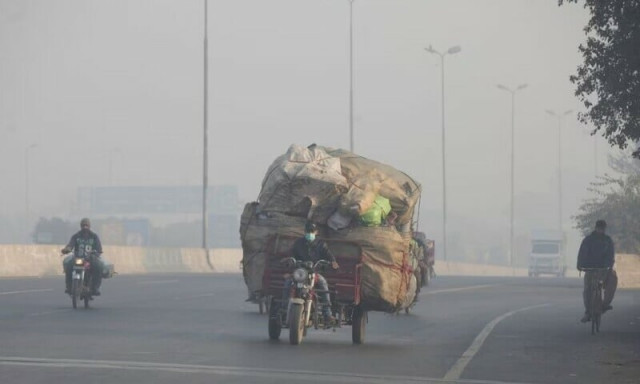Smog’s chokehold to continue
Lack of effective policies for reducing pollution will reduce the air quality next year

For Lahore’s populace facing a reduced lifespan due to the recurrent smog season, the pessimism of greyer skies ahead masks the optimism for greener pastures that they might have wished for in the new year.
Even though smog has been plaguing locals in Lahore since the past decade, in 2023 the Punjab government finally decided to move its muscles by declaring the hazard a health emergency and proposing short-term coping strategies to combat the momentary repercussions of smog through policies like mandatory usage of masks, school holidays on Fridays, bans on brick kilns and factories, cleaning roads, and more recently artificial rain for washing away the toxins in the atmosphere.
Despite all these measures, experts are of the opinion that none of these strategies are enough to offer a long-term solution to the seasonal by-product of smoke and fog, which requires a more comprehensive, long-term prevention strategy. Therefore, until or unless permanent steps are taken to manage the severity of smog, 2024 and onwards might witness Lahore engulfed much deeper into atmospheric pollution.
Read Seasonal suffering : Government fails to prevent annual smog onslaught
“How can spraying water on roads and closing schools three days a week, ever be expected to solve an endemic environmental issue like smog,” questioned Rafay Alam, a lawyer and environmental activist, who further implored that the government must understand the fact that environmental issues cannot be solved overnight by ad hoc policies and that long-term planning and implementation of concrete strategies were the only way forward.
Expanding on Alam’s concerns, Dawar Butt, a public policy and environmental management expert alleged that the Punjab government and the concerned departments were well aware of the urgency of smog and its impact on the local population but were unwilling to invest their time and energies into implementing long-term environmentally friendly strategies.
“Since 2018, there has been talk of introducing electric buses and rickshaws but no one knows when the provincial government will start replacing combustion vehicles. Similarly, the project for installing air quality monitoring equipment was also announced in 2018 but its completion till date is nowhere in sight,” regretted Butt, who predicted that a similar smog crisis would hit Lahore in 2024.
Read Smog: the new unfortunate reality of Lahore
Butt’s forecast perturbs health experts like Dr Imdad Ali Farooqi, consultant physician and pulmonologist at the Services Hospital in Lahore, who worry for the well-being and lifespan of Punjab’s locals who would continue to breathe in the world’s most polluted air. “Even though cold, cough, sore throat, shortness of breath and irritation in the eyes are the most apparent effects of smog adversely affecting people of all ages, a 2023 report by the Air Quality Life Index, claims that the average lifespans of citizens residing in highly polluted areas like Lahore, Sheikhupura, Kasur and Peshawar, can be reduced by up to 7 years,” warned Dr Farooqi.
In an attempt to unravel the long-term strategies for smog prevention in Punjab, the Express Tribune consulted a variety of policy experts. Citing the recommendations made by the Institute of Strategic Studies in Islamabad, most policy experts believed that although tackling air pollution in Pakistan was a convoluted challenge, decisive steps must nevertheless be taken in order to protect public health and conserve the environment.
Read As winter sets in, deadly smog chokes Pakistan
Among the list of long-term plausible solutions given for a reduction in smog and air pollution, were the ban of substandard fuel, use of hybrid vehicles, promotion of public transport and carpooling, management of industrial pollution, investment in cleaner production technologies, regulation of safe garbage disposal, monitoring of recycling, encouragement of tree plantation on and around residences and buildings, and the incentivization of research and development in the domain of smog control. It is interesting to note that experts’ emphasis on the need for research on smog was just recently confirmed by the Chief Minister of Punjab, Mohsin Naqvi during the Cabinet Committee meeting held at the Chief Minister’s Office in which environmentalists and health experts were consulted in detail about the prevailing situation of smog.
“It is unfortunate to confess that till date, we do not have any authentic research on the smog crisis in Punjab. So far, we have been relying solely on hearsay and speculation. Therefore, we have now decided to conduct a study in association with international consultants to unveil the real reasons behind the worsening of the smog crisis,” announced Naqvi who further opined that comprehensive measures against smog were the need of the hour, and they could only be put into practice with the help of reliable research.
Published in The Express Tribune, December 27th, 2023.



















COMMENTS
Comments are moderated and generally will be posted if they are on-topic and not abusive.
For more information, please see our Comments FAQ